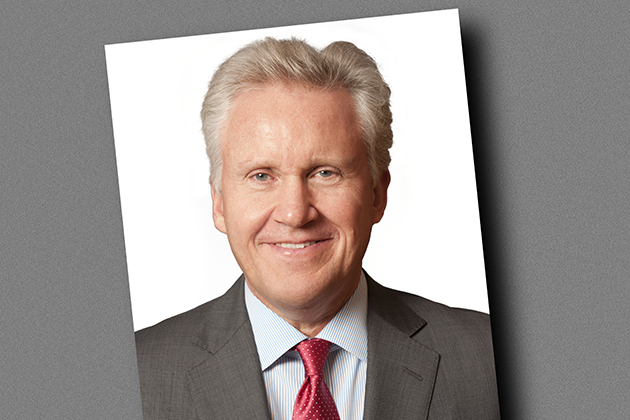
Jeffrey Immelt, chairman and chief executive officer of General Electric Corp., will receive an honorary degree and serve as a keynote speaker during the University of Connecticut’s commencement weekend in May.
The UConn Board of Trustees has approved the award of the honorary Doctor of Humane Letters degree to Immelt, the leader of Fairfield-based GE and a repeat honoree on TIME magazine’s list of the world’s 100 most influential people.
Immelt is chairman of the advisory board to the President’s Council on Jobs and Competitiveness and in that role, he oversees collaborative efforts between UConn and GE in connection with the development of UConn’s Technology Park.
GE and its employees also are valued participants in mentoring and internship programs, and a partner in efforts by the state, UConn, and the corporate community to build an innovation-driven economy in Connecticut.
Immelt is also a member of Change the Equation, a CEO-led initiative to move the U.S. to the top of the pack in science and math education over the next decade. That’s a perfect complement to the proposed Next Generation Connecticut initiative, which would revitalize the state’s job creation efforts through strategic investments in UConn facilities, curriculum, faculty, and research in science, technology, engineering, and math (STEM) fields.
“Jeff Immelt and our other UConn honorary degree recipients represent the highest ideals in scholarship, research, economic development, the humanities, and service to others,” President Susan Herbst says.
“They’re a wonderful example to our graduates and our University community of the value of education, and the imperative to take all they’ve learned and quite literally make the world a better place,” she says. “UConn is honored to recognize them as they share their experiences and expertise with a new generation of scholars, innovators, and leaders.”
UConn expects to graduate approximately 7,000 students during commencement ceremonies at the Storrs campus on May 11 and 12, and its schools of Medicine and Dental Medicine will award degrees during ceremonies on May 13.
Immelt will speak at UConn’s Graduate School commencement on Saturday, May 11. He is among eight honorary degree recipients being honored during the weekend, including a nationally renowned novelist, an acclaimed actor and producer, an internationally noted social scientist and researcher, and others who have reached impressive heights in their professional and personal lives.
Others who will receive honorary degrees:
- Wally Lamb ’72 (CLAS), ’77 MA, the heralded author of such works as She’s Come Undone and I Know This Much is True. Lamb, a Mansfield resident, also has served as an associate professor of English at UConn, where he taught creative writing and originated a student-staffed literary and arts magazine, The Long River Review. He will receive an honorary Doctor of Humane Letters degree and deliver the keynote address at the Neag School of Education’s commencement on May 12.
- Dr. Ferid Murad, a teacher, clinician, and researcher who won the Nobel Prize in Physiology or Medicine in 1998 and the Albert Lasker Award for Basic Medical Research in 1996. His key research demonstrated that nitroglycerin and related drugs work by releasing nitric oxide into the body, which acts as a signaling molecule in the cardiovascular system and results in dilation of blood vessels. Murad’s work in cardiology complements the work being done at the Pat and Jim Calhoun Cardiology Center at the UConn Health Center, and his work on stem cells also aligns him with the mission of the Health Center’s Cell and Genome Sciences Center. He will be honored with a Doctor of Science degree and will speak during the Health Center commencement on May 13.
- Jerry Adler, an acclaimed television and movie actor whose credits include roles on The Sopranos, The Good Wife, and many other stage and film productions. He also was a Drama Desk Award nominee for “Outstanding Director of a Musical” in 1976 for the Tony Award-winning musical My Fair Lady. Adler, who visits UConn in Storrs each Monday to teach dramatic arts students, will be honored with a Doctor of Fine Arts degree at the School of Fine Arts commencement on May 11.
- Charles Zwick ’50 (CANR), ’51 MS, who was director of the federal Office of Management and Budget under the Lyndon Johnson administration. He also is a stalwart supporter of UConn, particularly in the field of agricultural economics. His philanthropy has allowed UConn to reinvigorate its Food Marketing Policy Center – now named the Zwick Center for Food and Resource Policy – and to expand its impact with an ambitious agenda of important research topics. Zwick will receive a Doctor of Humane Letters degree from the College of Agriculture & Natural Resources and serve as keynote speaker at its May 11 commencement.
- Elizabeth Shanahan, executive director and CEO for the Society of Women Engineers and a longtime leader in her field. She also is a renowned champion of programs that encourage female students, professional women, and underrepresented groups to enter STEM fields (science, technology, engineering, and math). She will be honored with a Doctor of Science degree from the School of Engineering at its May 11 commencement, where she will deliver the keynote address.
- Gary Bailey and Lyudmila Harutyunyan, who each will be recognized with Doctor of Humane Letters degrees during the School of Social Work ceremony on May 11. Bailey, a professor at Simmons College, is an internationally recognized leader, scholar, and educator in social work, diversity, human rights, and related fields. He will deliver the keynote address at the commencement. Harutyunyan, known as the “mother of Armenian social work,” is a highly regarded researcher and educator whose work has taken her around the world and who also is a former member of the Congress of the People’s Deputies in the Soviet Union. She is regarded as a particularly courageous scholar, often writing about important social topics in countries that discouraged discussions about the issues or denied they were occurring.


